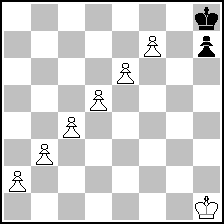|
|
| (1) Posted by Arpad Rusz [Monday, Sep 25, 2017 00:49] |
Paco Ŝako
This new chess variant might be suitable for chess composition. The main change of the classical rule is that pieces do not capture but create a black-white piece union on the same square.
"Creating a union
Create a union by uniting your piece with any of the pieces of the other player. If you create a union with the King of the other player, then you have won the game!
Moving a union
Once united, both players can keep playing the union. You can only move a union based on the rules of movement of YOUR piece within the union.
Taking over a union
By playing one of your own pieces into an existing union, you can then release your piece that was originally in the union, allowing it to move out onto the board within the same move.
Chain reaction
One of the most interesting moves in Paco Ŝako is the chain reaction which takes place within one move. This new aspect results in fun and dynamic moves and unexpected twists and turns within the game."
More detailed rules can be found here: https://pacosako.com/
|
|
| (2) Posted by ichai [Monday, Sep 25, 2017 07:24] |
Some questions :
1) a piece never disappears ?
2) the king never takes ?
3) a pawn brought to its first rank how does it move ?
4) a pawn brought to promotion by the opposite side, who will choose the promotion ?
5) can a 0-0 or 0-0-0 be made after the rook was taken ?
5a) taken then moved by the opposite side and then brought back by the opposite side ? (Or by its side)
6) what about "en passant"?
7) you write "can" release, does it mean that it is not mandatory ?
|
|
| (3) Posted by Arpad Rusz [Monday, Sep 25, 2017 09:36]; edited by Arpad Rusz [17-09-25] |
1) Yes, the pieces never disappear.
2) Yes, the king never takes ("hugs").
3) A pawn brought to its first rank moves like from the second rank.
4) If a pawn is brought to promotion by the opposite side, the pawn's side chooses the promotion at the beginning of his turn, before making its regular move.(Of course for composition every rule can be changed.)
5) I don't know the answer. The rules are unclear on this issue.
5a) You cannot castle because the rook has moved.
6) En passant is allowed even with united pieces.
7) You have to release the piece. There can be only two pieces hugging on a square.
The pawns can hug only by diagonal moves.
If there would be no place for a released piece to go to (which can easily happen if that piece is a pawn) you can also not move into the square where it is hugging.
https://pacosako.com/wp-content/uploads/2017/04/Paco-%c5%9cako-game-rules-ENG.pdf
|
|
| (4) Posted by Arpad Rusz [Monday, Sep 25, 2017 13:49] |
I would prefer that the kings could capture. Otherwise positions with less than 32 man are illegal. The checkmate positions also would be more natural.
|
|
| (5) Posted by Arpad Rusz [Monday, Sep 25, 2017 13:49] |
I would prefer that the kings could capture. Otherwise positions with less than 32 man are illegal. The checkmate positions also would be more natural.
|
|
| (6) Posted by Geir Sune Tallaksen Østmoe [Monday, Sep 25, 2017 22:50]; edited by Geir Sune Tallaksen Østmoe [17-09-25] |
Interesting variant!
The rules don't seem to cover stalemate. With no captures, there can't be many stalemate positions, but it is possible.
A more relevant question is whether a piece is allowed to move twice during a chain. I don't see anything in the rules that prevent it. That means you can give check, or even checkmate, in a position where the king doesn't appear to be in check. Consider this situation:
 (= 4+1 ) (= 4+1 )
The queen, bishop and knight are all in union with a black piece, while the rook is not. Black's king is in check in this position, because White to move would play the chain move Ra8-Sb6-Ba5-Qa8-Rb8.
|
|
| (7) Posted by Arpad Rusz [Tuesday, Sep 26, 2017 00:55] |
 (= 7+2 ) (= 7+2 )
All white pawns except a2 is hugged by a black pawn.
Checkmate in 1.
Excelsior in one move!
|
|
| (8) Posted by Georgy Evseev [Tuesday, Sep 26, 2017 08:45] |
A pendulum perpetual movement is possible. Is it a draw? Or is there a rule that prevents it?
|
|
| (9) Posted by Arpad Rusz [Tuesday, Sep 26, 2017 10:15]; edited by Arpad Rusz [17-09-26] |
I have found only this rule:
"Repeated moves: When the same move has been played by both players three times in a row with the same piece in the same position on the board, the players will automatically draw."
There is nothing in the rules to avoid a cycle during a single move. There could be four solutions:
During a move it is forbidden
1) to move the same piece twice
2) to move on the same square twice with any piece
3) to move the same piece twice to a given square
4) to repeat positions
|
|
| (10) Posted by Arpad Rusz [Wednesday, Sep 27, 2017 22:54] |
You can even play it online! It is fun although I have found a bug: the engine got into a perpetual cycle when tried to play a move. Its rook and queen were exchanging places forever (both of them hugging some other pieces).
http://hgm.nubati.net/paco/
|
|
No more posts |
MatPlus.Net  Forum Forum  General General  Paco Ŝako Paco Ŝako |
 ISC 2024
ISC 2024 Forum
Forum  General
General  Paco Ŝako
Paco Ŝako 


